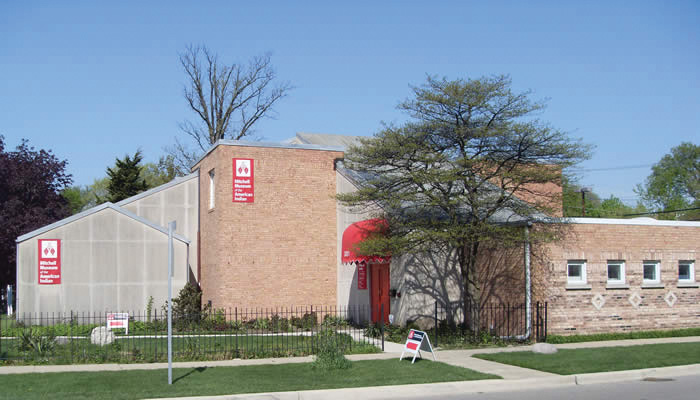Mitchell Museum of the American Indian recognizes three Native American activists
Photo courtesy The Mitchell Museum of the American Indian
The Mitchell Museum of the American Indian, 3001 Central St. The museum honored three people for their contributions to social activism in the community.
November 3, 2019
The Mitchell Museum of the American Indian held its 10th annual Dr. Carlos Montezuma Honorary Lecture and Awards event on Saturday. The ceremony honored American Indian tribal members Frank Bibeau, Willy White and Michael Roberts.
At the event, the museum presented three awards: the Montezuma Honorary Award, the Woodrow “Woody” Crumbo Award and the Elizabeth Seabury Mitchell Award, recognizing important contributions in social activism for the community. Bibeau, the recipient of the Montezuma Award and a member of the Ojibwe tribe, also gave a keynote speech on his life and work as a tribal attorney.
The lecture series was proposed 10 years ago, near the beginning of MMAI executive director Kathleen McDonald’s tenure. Museum board member Frances Hagemann came to McDonald with the idea, and though the event originally started with only the Montezuma Award, the Crumbo Award and the Mitchell Award were added soon after.
“Hagemann proposed this idea of having an award lecture to recognize Native community members that have done foundational work in social justice on a national scale,” McDonald said. “She suggested naming it for Montezuma because he had local ties, but had also done incredible work on the national level.”
At the beginning of the event, Hagemann spoke to the audience about Montezuma’s life and the importance of the award.
Montezuma was a member of the Yavapai tribe and came to Chicago to attend medical school, Hagemann said. She said that after he received his medical degree, one of his main goals was to improve medical care for American Indian tribes — a disparity that still affects the country today. According to the Indian Health Service, American Indians in the United States have an average life expectancy that is 5.5 years lower than the general American average.
“An important reason for studying history is to see how the past has affected the future,” Hagemann said. “Sometimes, that is very little.”
The award recipients were recognized for their work in social activism and furthering the causes of American Indian groups. White, a member of the Tsimshian tribe, received the Crumbo Award. He has practiced the art of chilkat weaving — a style of fabric weaving — for over 30 years, and continues to teach others the technique.
Judy Hoffman, an American Indian filmmaker, accepted the award for White. She said that his work continues to help keep the culture and art alive.
“The issue of repatriation is still a struggle today,” Hoffman said. “People and museums refer to our culture in the past tense, but it is very much alive.”
Roberts, a member of the Tlingit tribe and the CEO of the First Nations Development Institute, received the Mitchell Award. In his role, Roberts works to further philanthropic causes for the betterment of American Indian groups.
Bibeau, a tribal attorney, has fought for American Indian rights in court, especially in relation to financial and agricultural efforts of groups. He often contests decisions limiting the rights of Native Americans to fish or farm on non-reservation lands, working to expand legal support of their actions.
“History finds you — sometimes it’s sitting right there,” Bibeau said. “But you have to look. You have to listen. You have to ask.”
McDonald said there often isn’t much discussion about American Indian activism, which can be discouraging for those who might want to fight for their rights.
However, she said that she hopes the awards will change the narrative about American Indian people, and she’s seen some of that change taking place over the past 10 years.
“The awards bring much-needed recognition to Native people who are doing this type of work,” McDonald said. “Often, Native people are treated as invisible. By recognizing them, it really brings light to the work they’re doing, but it also provides role models for Native community members.”
Email: [email protected]
Twitter: @jacobnfulton1


